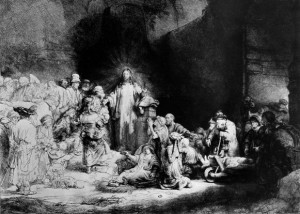 Christ, Christianity and Judaism
Christ, Christianity and Judaism
The place, the personality, and the connections of Celsus, as well as the external circumstances of his literary activity, remain unknown to us, as they were even to his third-century literary opponent, Origen (see Origenes, Contra Celsum, I, 8). His sole known work, the Άληϑής Λόγος “True Doctrine”, has been preserved only in the quotations included by Origen in his reply to Celsus’ arguments (No. 375). It may be stated with certainty that Celsus launched his great attack on Christianity in the reign of Antoninus Pius (July 138 C.E. – March 161 C.E.).
To Celsus, Christianity appears as a false and destructive doctrine, by no means a pure monotheism (VIII, 12), but a creed characterized by an irrational belief in Christ, a doctrine originating among the Jews, and appealing mainly to the most foolish and lowest elements of society. He sees in the Christian state of mind a threat to civilization and to the future of the Roman state. Celsus therefore exhorted the Christians to help the Roman emperor by changing their minds and by cooperating with him in what was right (VIII, 73).
Celsus’ attitude to the Jews and their religion was conditioned above all by the inherent connection between Judaism and Christianity. To disprove the intellectual and religious foundations of Christianity he found it necessary to strike at Judaism as the root of evil. His views on the Jewish religion are deeply influenced by the opinions traditionally held by many Greek and Latin authors, and Celsus does not share the sympathetic approach to Judaism of his contemporary Numenius (Nos. 363a-369).
In his criticism of Judaism, Celsus is more penetrating than any of his pagan predecessors. He also shows awareness of a fundamental distinction between the religion of the Jews and Christianity. For while displaying hostility towards Judaism, Celsus sees it, in contrast to Christianity, as a national religion, and to him it is therefore only natural that the Jews should adhere to it.
It is a main feature of the Άληϑής Λόγος that the arguments against Christianity are put into the mouth of a Jew. Celsus may have been influenced in his use of a Jew as the disputant against Christianity by the similar device in Justin’s Dialogus cum Tryphone.
One of the arguments put forward by the Jew is a refutation of Jesus’ claims to messiahship. The Jew asks why Jesus in particular should be singled out as the Messiah of the biblical prophecies, among the multitudes of other people who had lived after the prophecies were uttered. Then it is asked why Jesus, if he were the son of God, did not become king when he grew up but instead lived a life of wandering, cowering in fear and destitution. As to the miracles said to have been wrought by Jesus, the Jew maintains that even if these had been performed, they should only be put on the same level as the works of other Egyptian-style sorcerers. Additionally, unlike Jesus, a god would not have had a corruptible body, he would not have been born as he was, and would not have eaten the food he did.
The beginning of Book II of Origen’s Contra Celsum contains an argument specifically addressed by the Jew to the Jewish Christians, his coreligionists, who had joined Jesus, have been deluded into abandoning their ancestral law. Celsus’ Jew again emphasizes the fact that many others similar to Jesus had appeared to deceive people who wanted to be deceived. Jews could not regard as God one who in general did not fulfill anything that he had promised to do, who had been condemned by Jews, caught in hiding and betrayed by his own disciples. If he was a god, it is asked how all this could happen. The Jew argues that the messianic claims of Jesus are refuted by the actual words of the prophets, who tell that the one who comes will be a great prince, ruler of all nations and of the whole earth. The same criticism applies also to the Christian equation of the Son of God with the Logos, for the Christians’ Son of God is not a pure and holy Logos but a man who was arrested by the authorities and crucified. In regard to the resurrection of Jesus, this was witnessed only by a hysterical female and possibly by another deluded by the same sorcery. To prove his divine power Jesus ought to have shown himself before he was maltreated and condemned, and to display his divinity he should have disappeared from the cross. When he was punished he was seen by all, but when he rose again he was observed only by one woman and by his own followers, whereas logically the opposite ought to have happened.
The Jew depicted by Celsus undoubtedly belongs to a Hellenistic Jewish cultural milieu, as may be deduced from the knowledge that he displays of Greek literature and mythology. He also makes use of the Logos concept familiar to Hellenistic Jewry.
Άληϑής Λόγος, apud: Origenes, Contra Celsum
He says that deluded by Jesus, they (e.g. Jewish Christians) have left the law of their fathers, and have been quite ludicrously deceived, and have deserted to another name and another life … If Celsus had known all this, he would not have represented the Jew as saying to converts from Judaism:
What was wrong with you, citizens, that you left the law of our fathers, and being deluded by that man whom we were addressing just now, were quite ludicrously deceived and have deserted us for another life?
Source: Menahem, Stern. Greek and Latin Authors on Jews and Judaism, Volume II (p. 224-226, 228-230, 269) CXIII. (Stern # 375)